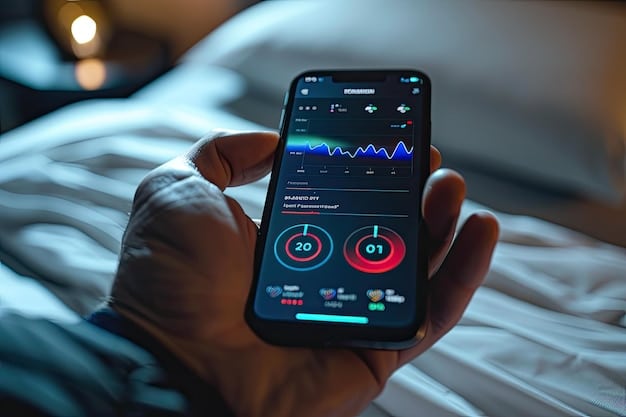Improve Sleep Quality: 6 Science-Backed Strategies

Anúncios
Improve your sleep quality by incorporating science-backed strategies such as maintaining a consistent sleep schedule, optimizing your sleep environment, managing stress, limiting caffeine and alcohol intake, engaging in regular physical activity, and considering cognitive behavioral therapy for insomnia.
Struggling to get a good night’s sleep? You’re not alone. Millions of people experience sleep disturbances, impacting their health, mood, and overall quality of life. The good news is that there are science-backed strategies you can implement to improve your sleep quality and wake up feeling refreshed.
Anúncios
Understand the Science of Sleep
Before diving into strategies, it’s crucial to understand the basics of sleep science. Sleep isn’t just a period of inactivity; it’s a complex biological process with distinct stages, each playing a vital role in physical and mental restoration.
Sleep Stages Explained
Sleep cycles through different stages, including light sleep, deep sleep, and REM (rapid eye movement) sleep. Deep sleep is crucial for physical recovery, while REM sleep is essential for cognitive function and memory consolidation.
Anúncios
The Role of Circadian Rhythm
Your body’s internal clock, the circadian rhythm, regulates sleep-wake cycles. This rhythm is influenced by external cues like light and darkness. Disruptions to your circadian rhythm, like jet lag or shift work, can significantly impact your sleep quality.
- Light Exposure: Exposure to natural light during the day helps regulate your circadian rhythm.
- Melatonin: This hormone, produced in response to darkness, promotes sleepiness.
- Consistency: Maintaining a regular sleep schedule reinforces your body’s natural rhythm.

Understanding the science behind sleep empowers you to make informed decisions about your sleep habits and lifestyle choices.
Establish a Consistent Sleep Schedule
One of the most effective ways to improve your sleep quality is to establish a consistent sleep schedule. This means going to bed and waking up around the same time every day, even on weekends.
Why Consistency Matters
A regular sleep schedule helps regulate your body’s natural circadian rhythm. This rhythm controls the release of hormones like melatonin, which promotes sleepiness, and cortisol, which promotes wakefulness.
Tips for Maintaining a Schedule
It can be challenging to stick to a consistent sleep schedule, especially if you have a variable work schedule or social life. However, here are some tips to help you stay on track:
- Set an Alarm: Wake up at the same time every day, even if you feel tired.
- Resist the Urge to Sleep In: On weekends, try to wake up within an hour of your weekday wake time.
- Create a Bedtime Routine: Prepare your body for sleep by engaging in relaxing activities before bed.
Establishing a consistent sleep schedule takes time and effort, but the benefits to your sleep quality and overall health are well worth it.
Optimize Your Sleep Environment
Your sleep environment plays a significant role in your ability to fall asleep and stay asleep. Creating a conducive sleep environment can significantly improve your sleep quality.
Key Elements of a Good Sleep Environment
There are several key elements to consider when optimizing your sleep environment:
- Darkness: Make sure your bedroom is dark. Use blackout curtains or an eye mask to block out light.
- Quiet: Reduce noise levels in your bedroom. Use earplugs, a white noise machine, or a fan to mask distracting sounds.
- Temperature: Keep your bedroom cool. The ideal sleep temperature is typically between 60 and 67 degrees Fahrenheit (15.5 to 19.4 degrees Celsius).
Invest in Comfortable Bedding
Your mattress, pillows, and bedding can also impact your sleep quality. Invest in comfortable, supportive bedding that suits your preferences.

Optimizing your sleep environment is a simple yet effective way to promote restful nights and improve your sleep quality.
Manage Stress and Anxiety
Stress and anxiety are common culprits behind sleep problems. When you’re stressed, your body releases cortisol, which can interfere with sleep. Managing stress is crucial for improve your sleep quality.
Relaxation Techniques
There are many relaxation techniques that can help calm your mind and prepare your body for sleep:
- Meditation: Practice mindfulness meditation to focus on the present moment and reduce racing thoughts.
- Deep Breathing: Slow, deep breathing exercises can help lower your heart rate and reduce stress.
- Progressive Muscle Relaxation: This technique involves tensing and releasing different muscle groups to promote relaxation.
Establish a Wind-Down Routine
Create a relaxing bedtime routine to help signal to your brain that it’s time to sleep. This could include taking a warm bath, reading a book, or listening to calming music. Avoid screen time before bed, as the blue light emitted from electronic devices can interfere with melatonin production.
Effectively managing stress and anxiety is an essential component of achieving better sleep.
Limit Caffeine and Alcohol Intake
Caffeine and alcohol can both negatively impact your sleep improve your sleep quality. While they may seem like helpful aids to get through the day or unwind at night, their effects on sleep architecture can be detrimental.
The Effects of Caffeine
Caffeine is a stimulant that can interfere with your ability to fall asleep and stay asleep. It blocks adenosine, a neurotransmitter that promotes relaxation and sleepiness. Caffeine can stay in your system for several hours, so it’s best to avoid it in the afternoon and evening.
The Effects of Alcohol
Although alcohol may initially make you feel sleepy, it disrupts your sleep later in the night. Alcohol can interfere with REM sleep, leading to fragmented and poor-quality sleep. It’s best to avoid alcohol close to bedtime.
Limiting your intake of caffeine and alcohol, especially in the hours leading up to bedtime, can significantly improve your sleep quality.
Engage in Regular Physical Activity
Regular physical activity can promote better sleep. Exercise can help reduce stress, improve mood, and regulate your circadian rhythm. However, it’s important to time your workouts carefully.
The Benefits of Exercise for Sleep
Exercise can have several benefits for sleep:
- Reduces Stress: Physical activity can help alleviate stress and anxiety.
- Improves Mood: Exercise releases endorphins, which have mood-boosting effects.
- Regulates Circadian Rhythm: Regular exercise can help reinforce your body’s natural sleep-wake cycle.
Timing Your Workouts
Avoid intense exercise close to bedtime, as it can have a stimulating effect and make it harder to fall asleep. Aim to finish your workouts at least a few hours before bed. Light to moderate exercise, like walking or yoga, may be beneficial in the evening.
Incorporating regular physical activity into your routine can be a powerful tool for improve your sleep quality.
| Key Point | Brief Description |
|---|---|
| ⏰ Consistent Sleep Schedule | Wake up and sleep at the same time daily. |
| 🌃 Optimized Sleep Environment | Ensure darkness, quiet, and cool temperature. |
| 🧘 Manage Stress | Use relaxation techniques like meditation. |
| ☕ Limit Caffeine/Alcohol | Avoid intake close to bedtime for restful nights. |
Frequently Asked Questions
▼
Ideally, it should take you between 10 to 20 minutes to fall asleep. If it takes you much longer or shorter, it could indicate an underlying issue.
▼
Sleeping on your back with a pillow under your knees can help maintain the natural curve of your spine and reduce back pain.
▼
While a little extra sleep on weekends can help, it’s best to maintain a consistent sleep schedule to regulate your body’s circadian rhythm.
▼
Yes, the blue light emitted from phones can interfere with melatonin production, making it harder to fall asleep. Try to avoid screen time before bed.
▼
If you consistently have trouble sleeping or experience symptoms like excessive daytime sleepiness, consult a healthcare professional.
Conclusion
Improve your sleep quality is achievable by understanding sleep basics and putting these simple six strategies in place. It might take time and commitment, but prioritizing good sleep habits could significantly improve your well-being, energy levels, and overall life quality.





